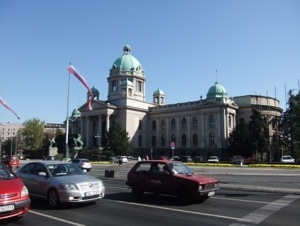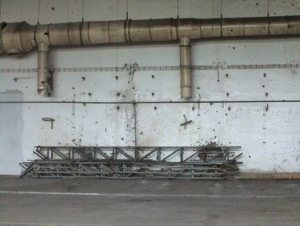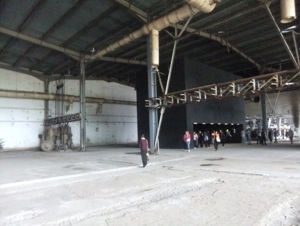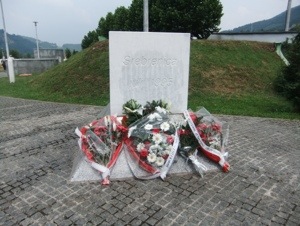Yesterday was a day full of meetings! First, we met with a member of the Serbian Progressive Party at the Parliament building who talked a bit about corruption, EU accession, and Serbian political parties. He told us that they have a rather large issue with corruption in Serbia, but they are actively tackling the issue and confident that they will be able to deter officials from accepting/requesting bribes. He is also confident that Serbia will enter the EU at some point, and accession talks are to begin in January 2014. One issue that I found is that citizens are still divided about joining the EU. Previous governments repeatedly promised that EU accession would be easy and they would enter as a way to get re-elected, thus people are skeptical about the process and whether it will be worth it or not. The parliamentarian stated that they hope to be a full EU Member State within 4 to 5 years, which I personally feel is a bit of a reach, but I guess you never know. If the government is truly motivated to get their laws in check with EU standards and to combat the issues that they have, then it may be possible.
Our second meeting was with the Former Serbian Ambassador to France, and we met at the Serbian Academy of Sciences and Arts (which I know about from writing my senior capstone). He was a very passionate man and seemed like a genuinely nice person; however, he was quite clearly biased in many of his opinions. He began by giving us a historical overview of the history of Kosovo but it appeared as though he was pretty against the Albanian view. He stated how Albanians were complaining of Serbian aggression in the region, yet quickly countered this with accounts of Albanian aggression against Serbs. He also stated that Serbs were the only peoples in the region who wanted to maintain a Yugoslavia – however he failed to mention that due to Serb aggression, this continued “Yugoslavia” would have more realistically been a Greater Serbia with little recognition of minorities. An interesting question that he raised was related to the rise of the Kosovo Liberation Army (KLA), which was an Albanian army that really failed to include any other minorities or ethnic groups. He asked: why can’t Serbs in Bosnia or Croatia secede if Albanians in Kosovo can? I definitely thought that this was an interesting point to raise and something I’d like to look more into.
Our final meeting of the day was with the Former Serbian Ambassador to the US. He told us about the baggage that had to be dealt with in order to improve Serbia-US relations, including the Kosovo issue, frozen funds, and trading relations. He also stated that the US has a kind of ownership or special relationship regarding Kosovo due to the NATO bombings, which I hadn’t really thought of but found interesting to consider. He believes that it is better to make war than impose sanctions, and I must say I agree. Sanctions do very little to actually hinder the government that they are meant to punish – innocent civilians suffer, it sucks the blood out of a nation, legitimizes politicians, and criminalizes the population when a black market arises. Sanctions serve very little other purpose than to pacify the US and the more broad international community into feeling as though they have taken action against injustice.
Overall, yesterday was a VERY full day, but it consisted of really interesting people and conversations that have really made me want to further study up on Kosovo and the problems that it faces – both politically, socially, and economically.










